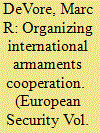| Srl | Item |
| 1 |
ID:
114215


|
|
|
|
|
| Publication |
2012.
|
| Summary/Abstract |
Few issues are more important to scholars of Europe's emergence as a foreign policy actor than whether the European Union (EU) can forge a common defense-industrial policy out of 27 states' procurement policies and defense industries. Overlooked in most scholarly analyses of European defense-industrial cooperation, the story of Europe's international armaments organizations stretches back more than six decades. In this article, we examine the impact of past institutional outcomes on the defense-industrial field by applying the concepts and analytic tools of historic institutionalism to European armaments organizations. Because past institutional dynamics have channeled the subsequent development of armaments cooperation, what has emerged is a polycentric governance architecture wherein organizations with transatlantic, pan-European and restrictive-European memberships dominate distinct components of the cooperative process. We demonstrate that this maturing institutional pattern will likely limit the opportunities for the EU - and especially its Commission - to shape the future contours of European defense-industrial cooperation.
|
|
|
|
|
|
|
|
|
|
|
|
|
|
|
|
| 2 |
ID:
162501


|
|
|
|
|
| Summary/Abstract |
Coordinating defence-industrial relations towards harmonising and facilitating procurement policies, production processes and the joint operability of their member-states’ national defence sectors, International Armaments Organisations (IAOs) play an important role in armaments cooperation. How can we explain their institutional development? Existing literature tackles this question using International Relations theories to mid-range theories of institutions and integration. However, they adopt overly state-centric viewpoints, assume actor interests as given, and disregard the changes in the global economic landscape that constitute the backdrop of armaments cooperation. In response, we shift the focus onto a key group of actors: the defence firms. Using a Neo-Gramscian Historical Materialist approach, we investigate how the globalisation of the defence market has created a transnational defence-industrial class in Europe, and demonstrate how its economic interests have fundamentally shaped the institutional frameworks of European IAOs. We focus on the Organisation for Joint Armaments Cooperation (OCCAR) and the European Defence Agency (EDA) to illustrate our argument. Our conclusions have implications for the study of armaments cooperation, particularly highlighting how the economic nature of this policy domain necessitates a closer look at the global and regional production relations, and the agency of the defence firms.
|
|
|
|
|
|
|
|
|
|
|
|
|
|
|
|